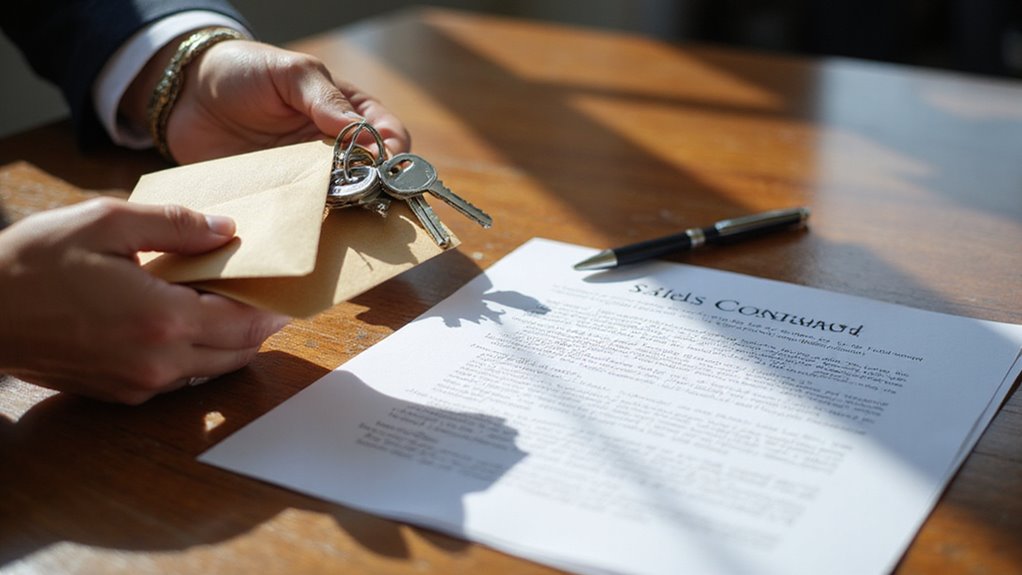Selling a rental property brings up a big question: what happens to the tenants’ security deposits? This issue can confuse both landlords and buyers. Mishandling deposits can lead to legal trouble and unhappy tenants.
Many landlords do not realize how strict the rules are. Some forget to transfer deposits or fail to notify tenants properly. These mistakes can cause arguments, lost money, or even lawsuits after the sale.
The best way to handle security deposits when selling a rental is to follow state laws and document every step. Notify your tenants, transfer deposits correctly, and keep clear records. This approach protects everyone involved. This blog will guide you through each step to help you avoid mistakes and keep the process smooth.
Key Takeaways
- Review state laws and your lease agreement to ensure compliance with all security deposit transfer or refund requirements during the sale.
- Notify tenants in writing about the property sale and clearly explain how their security deposit will be handled or transferred.
- Conduct a pre-sale inspection, document current property condition, and address any needed repairs to prevent future deposit disputes.
- Properly document and transfer the security deposit to the new owner, including written records of amounts, deductions, and notices to all parties.
- Maintain thorough records and provide tenants with itemized statements for any deductions, following all legal timelines and procedures for dispute resolution.
Understanding State Laws on Security Deposits

Every state has its own rules about security deposits. You need to know your state’s laws before selling a rental property. These laws tell you how much you can collect, where to keep the money, and when to return it.
If you do not follow these rules, you could face legal trouble and financial penalties. State laws also explain how to refund deposits and when you can keep money for damages. You should also be aware that failure to disclose important information—such as the status of security deposits—could lead to legal responsibility and lawsuits. You should follow these steps to avoid disputes with tenants.
Understanding your state’s requirements will help you handle deposits correctly. This also protects you if questions about the deposit come up during the sale. Always check your state’s laws for accurate information. Many local trusted home buyers offer simple guidance on how to transfer security deposits as part of a smooth, stress-free sale.
Reviewing the Lease Agreement Terms
You need to scrutinize your lease agreement for specific clauses addressing the handling of security deposits. Pay close attention to any provisions that outline how deposits should be transferred if ownership changes. These terms will guide your legal obligations and help ensure a compliant transaction.
When reviewing your lease, keep in mind that escrow details are often managed by professional home buyers, allowing for a smoother and more secure transfer process during a sale. If you work with a family-owned local business, you may benefit from their expertise in coordinating paperwork and escrow for these transactions.
Identifying Deposit Clauses
A deposit clause in your lease explains how the security deposit is handled. It tells you where the deposit is kept and how it is returned. This clause protects both the tenant and the landlord.
If you find a deposit clause, check if the money is in a special escrow account. Some leases explain what happens to the deposit if the property is sold. They may require a quick refund or allow the deposit to move to the new owner.
State laws might be listed in your lease. These laws often set rules for holding and refunding deposits. If your lease mentions these laws, you must follow them to avoid problems during the sale.
Transfer Provisions Explained
Transfer provisions explain what happens to the security deposit when the property changes owners. They state if the deposit must go to the new owner or back to the tenant. These rules help everyone know their rights in a sale.
Some leases require written notice to tenants before the deposit transfers. The new landlord may have to take on all deposit responsibilities. If proof of transfer or tenant acknowledgment is needed, the lease should say so.
If the lease does not mention transfer steps, state law will apply. Usually, the deposit stays with the property and the new owner takes over. Always keep records of any deposit transfer to avoid disputes.
Notifying Tenants About the Sale

You must tell your tenants if you decide to sell your rental property. Most states ask for written notice about the sale. This notice should include important details and timelines. As you notify your tenants, be sure to mention that no real estate agent fees or commissions will be involved if you are selling directly to a local buyer.
Tenants need to know how their security deposits will be handled. You should explain if the deposit will be refunded or transferred to a new owner. Lease transfer steps and tenant rights must also be shared.
If you provide clear information, you help avoid confusion and build trust. Always keep records of your communication with tenants. This helps protect you if there are any legal questions.
If you’re selling your property without using a real estate agent, you may want to let tenants know about the quick and easy home-buying process so they understand what to expect during the sale.
Inspecting the Property Before the Sale
You must inspect the property before selling it. This checks the property’s condition and records any existing damage. It helps prevent arguments about the security deposit later.
Take photos and write down any problems you find. If you always checked tenants well, you may find fewer surprises now. Keep a record of any issues that were there before the sale. Working with local real estate market experts can help you identify potential issues that may affect a sale or security deposit return.
You should inform your tenants about the inspection and respect their rights. Proper property staging can show buyers the home’s best features. It may also reveal repairs you missed earlier.
If you keep all inspection records, you can use them if problems come up after the sale. These records will protect your interests. They also help with legal compliance.
If you plan to sell to cash home buyers, a detailed inspection is especially important since offers are often made quickly and based on current property condition.
Calculating the Exact Deposit Amount

To find the exact security deposit amount, review the original lease and any updates. Check for any deductions made for repairs or unpaid rent. Add or subtract interest if your local laws require it.
If you made deductions, keep all receipts and records as proof. Some states require you to give tenants an itemized list of deductions. You must communicate the final balance and any details to your tenant. When handling security deposits, it’s helpful to understand the pros and cons of selling as-is if you plan to sell the property without making repairs.
Accurate calculations lower the chance of disputes during the sale. If you follow all steps, you will meet your legal obligations. Always check your state and local rules for any special requirements. Remember, if you are also considering capital gains tax implications from selling your rental, keeping precise deposit records can help with your overall financial documentation.
Documenting the Security Deposit Transfer
A security deposit transfer must be documented when selling a rental property. This is required by law to protect all parties. Clear documentation helps avoid legal issues.
Prepare a written statement with the deposit amount and the date of transfer. Both the seller and buyer should sign it. If an escrow account holds the deposit, include its details and confirm the funds are untouched. When working with trusted cash home buyers, sellers can ensure a smooth and straightforward transfer process that covers all legal and financial obligations.
Attach any deposit insurance policies, if they exist. These may need updating or transferring to the new owner. Keep all receipts and related correspondence for your records.
The tenant should receive written notice about the new owner’s responsibility for the deposit. This notice should include the new owner’s contact information. Proper documentation can prevent future disputes over the deposit.
If the property is being sold through a land contract, it’s essential to review the contract terms and coordinate with all parties to ensure security deposit obligations are properly transferred.
Choosing Between Returning or Transferring the Deposit

When selling your rental, you must decide whether to return the tenant’s security deposit or legally transfer it to the new owner. State laws typically dictate the process and may require you to handle prorated deductions for damages or unpaid rent before the transfer. Additionally, if you’re considering selling to an LLC, keep in mind that such a transaction may have tax implications for both you and the buyer, especially regarding the handling of deposits and final accounting.
It’s essential that you comply with these regulations to avoid liability after the sale. If your property has foundation issues, be aware that these can affect both the sale process and your handling of security deposits, especially if deductions are warranted for property damage.
Legal Requirements for Transfers
Most states have clear rules for handling security deposits during a property sale. You must either return the deposit to the tenant or transfer it to the new owner. If you transfer the deposit, you need to follow specific steps.
Written notice must go to both the tenant and the buyer. This notice should state the deposit amount and explain the transfer terms. Documentation is necessary to avoid any disputes.
If you do not follow these steps, you might face legal issues. Some states also have deadlines for giving notice or making disclosures. Always check your local housing laws to make sure you comply.
Handling Prorated Deductions
Prorated deductions must be handled before transferring or returning a tenant’s security deposit. The current landlord must calculate any deductions for damages or unpaid rent during their ownership. Proper documentation is important because it affects the security deposit refund.
If you return the deposit, provide an itemized statement with the refund. Always follow your state’s deadline for returning security deposits. If you transfer the deposit to a new owner, share details and documentation of any deductions.
Clear communication about deductions protects you and the new owner. This helps you meet your landlord duties and legal obligations. Always check your state’s rules to avoid problems with the deposit.
Communicating With the Buyer About the Deposit
Clear communication about the security deposit helps avoid confusion and future problems with the buyer. You should give the buyer a written statement showing the deposit amount and any deductions. This step makes the process open and honest for both sides.
You must include documents that explain all deposit transactions. If there are claims or disputes with the tenant, you should inform the buyer. Always explain how you calculated the final deposit balance.
Let the buyer know how you will transfer the deposit, either directly or as a credit at closing. If you address these points early, you lower the chance of problems. Always keep copies of all documents and messages for your records.
For an even smoother transaction, consider working with a trusted local company that handles escrow and closing processes efficiently, ensuring all financial details—including security deposits—are managed transparently.
Outlining Security Deposit Responsibilities in the Sales Contract

You must clearly specify in the sales contract how and when the security deposit will transfer to the buyer, ensuring both parties understand their legal obligations. Address tenant notification requirements so you comply with state laws and avoid disputes after closing. Precise contract language protects you from future liability and helps the buyer assume responsibility without confusion.
Specifying Deposit Transfer Terms
A sales contract for a rental property must state how the tenant’s security deposit will be handled at closing. The contract should say if the deposit goes directly to the buyer or if it will be used as a credit. It must also state the exact deposit amount transferred.
If there is any interest earned on the deposit, the contract should explain how it will be divided. Any needed adjustments or prorations must be clear. The agreement should say who is responsible for future deposit disputes with the tenant.
Landlords should include a clause to protect themselves from deposit obligations after closing, unless both parties agree otherwise. This step helps both sides avoid future problems. Clear terms about the deposit transfer help prevent confusion and legal issues.
Addressing Tenant Notification Requirements
When you sell a rental property, you must tell your tenants about the new owner. Most states and cities require written notice to each tenant. The notice should include the new owner’s name, contact information, and who holds the security deposit.
Some areas have tight deadlines for sending this notice. If you do not follow these rules, you may face fines. Always check your local laws to avoid problems.
If the new owner plans to use security cameras, mention this in your notice. Tenants have privacy rights that must be respected. The sales contract should also state the buyer must follow all lease terms and protect tenant deposits.
Clear communication helps avoid misunderstandings. It also protects you from legal trouble during the sale. If you handle these steps well, the transition will be easier for everyone.
Handling Tenant Move-Outs During the Sale Process
Managing tenant move-outs during a property sale requires careful planning. You must follow all state and local laws. Review the lease to know the correct notice period and move-out rules.
Notify tenants about the sale and how it affects their rent payments. If the sale closes mid-month, explain any rent proration. Make sure tenants understand when they need to leave.
Inspect the property soon after the tenant leaves. Always give proper notice for inspections, as the law requires. Document the property’s condition with photos and notes.
Keep all records of communication and inspections. If disputes arise, these records can help resolve them. Following these steps protects your rights and those of your tenants.
Addressing Damages and Deductions
After a tenant moves out, you need to inspect the property for damages that exceed normal wear and tear. This inspection helps you decide if deductions from the security deposit are necessary. Always separate normal use from actual damage, such as broken fixtures or pet stains.
You should take clear photos and write detailed notes about any issues you find. These records will support your reasons for making deductions. If you miss documentation, you may not be able to keep part of the deposit.
The lease should be reviewed for rules about unpaid rent, cleaning, or pet deposits. Lease terms can affect what you can deduct. Always follow your state and local laws when deciding on deductions.
The table below lists common deduction reasons and the evidence needed:
| Deduction Reason | Evidence to Collect |
|---|---|
| Pet damage | Photos, repair estimates |
| Unpaid rent | Rent ledger, notices |
| Cleaning costs | Receipts, move-in photos |
| Broken appliances | Repair invoices |
| Wall/paint damage | Photos, contractor quote |
Providing Receipts and Statements to Tenants
You must give tenants a detailed written statement of all security deposit deductions. Most states require this within 14 to 30 days after move-out. If you do not provide this, you may lose your right to deduct.
List every deduction, such as repairs or unpaid rent. Attach receipts or invoices as proof for each item. If you forget receipts, you could face legal penalties.
Send the statement to the tenant’s last known address. Use clear and professional language. Good communication helps you follow the law and keep things fair.
Keeping Records for Tax and Legal Purposes
You need to keep clear records for tax and legal reasons. Good recordkeeping can protect you if there is a dispute or audit. These records help prove you managed security deposits correctly.
Record the amount, date, tenant’s name, and any interest if the law requires it. Store receipts, bank statements, and all related messages. If you do this, you will have proof if anyone asks for it later.
Keep these documents organized and easy to find for several years. Tax offices or courts may request them long after you sell the property. Proper records also show if deposits were kept separate from rental income.
If you follow these steps, you lower your legal risks. Good documentation also shows you followed the rules during the property transfer. This makes tax filing and resolving disputes easier.
Managing Disputes Over Security Deposits
Disputes over security deposits often happen when landlords and tenants disagree on deductions or refunds. Clear communication helps prevent confusion during a property sale. Landlords should explain all deductions in detail and share receipts and inspection reports.
Most states have laws about how and when to return security deposits. Landlords must follow these rules and give tenants timely updates. If a problem continues, both sides can try mediation before going to court.
Good records protect both landlords and tenants. Photos, emails, and receipts show the property’s condition and all payments. Careful documentation and honest communication make security deposit returns smoother and more fair.
Conclusion
Handling security deposits properly is important when selling a rental property. If you follow state laws and keep good records, you can avoid disputes. Clear communication with tenants and timely actions help ensure a smooth process.
If you are planning to sell your rental, knowing your responsibilities with deposits is key. Proper management protects you from legal issues and keeps your reputation strong. Responsible landlords benefit from careful documentation and transparency.
If you want to sell your rental property quickly, we buy houses for cash. Freedom Path Investors can help make your sale easy and hassle-free. Contact us today to learn more about how we can assist you.







